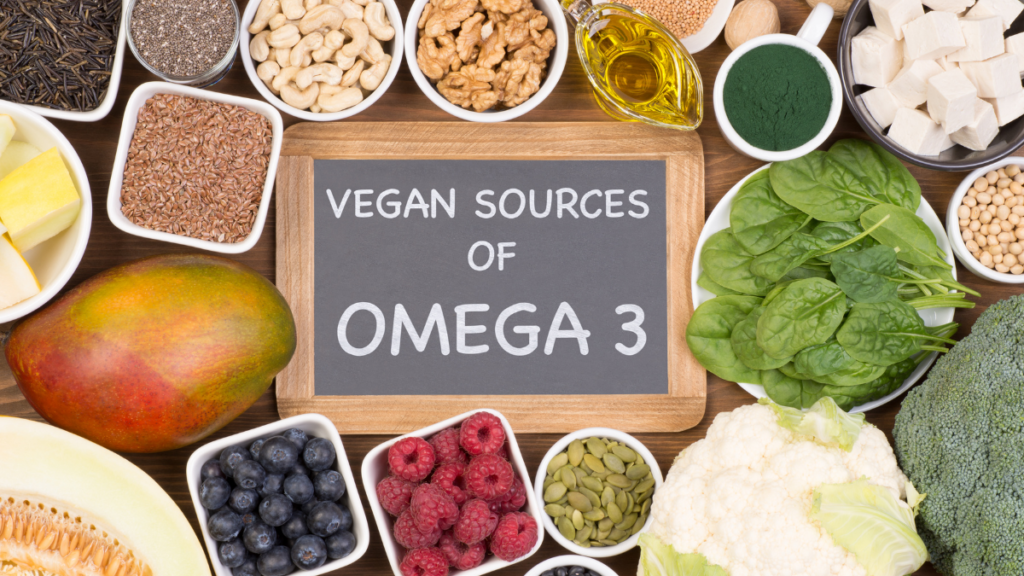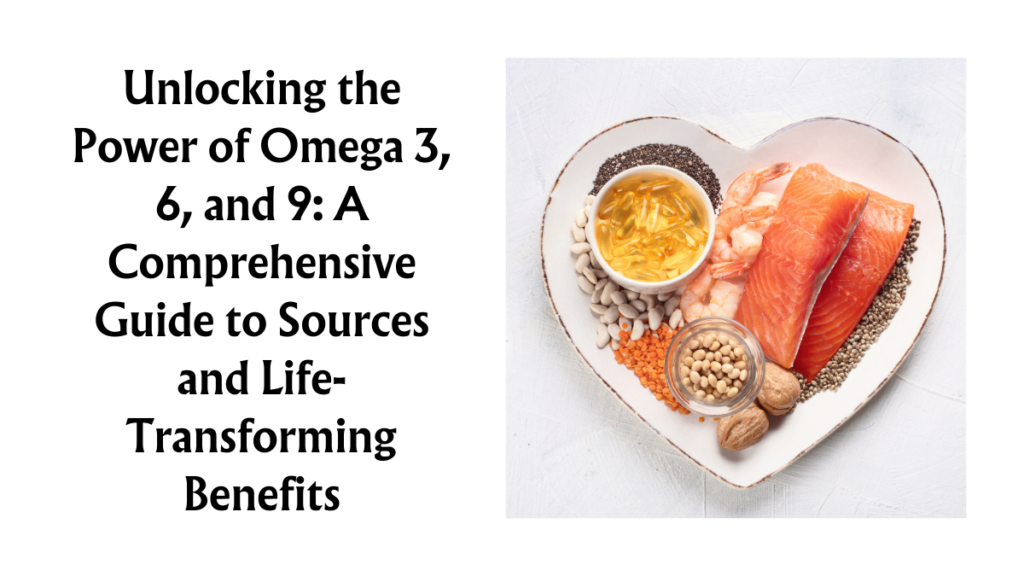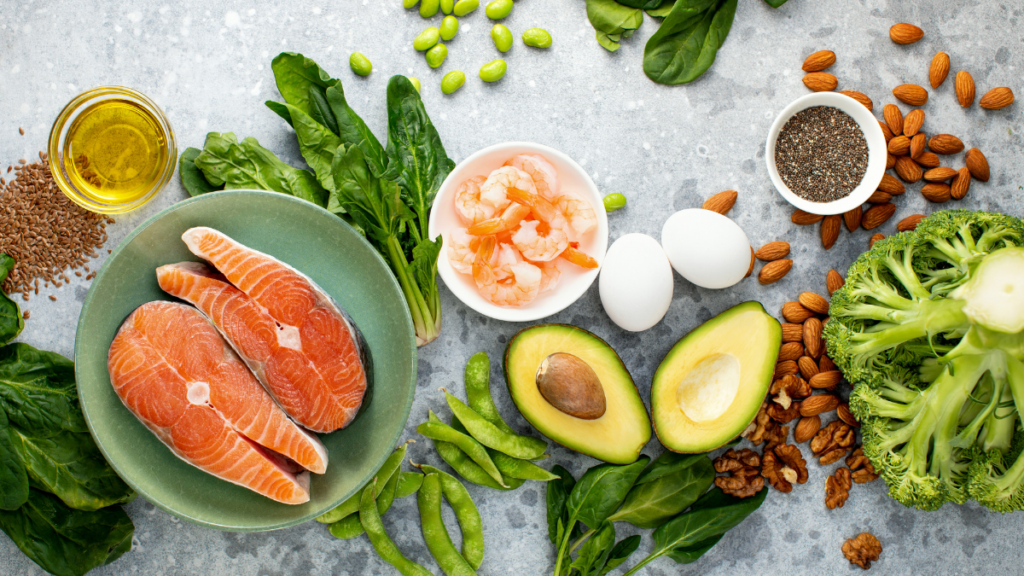Unlocking the Power of Omega 3, 6, and 9: A Comprehensive Guide to Sources and Life-Transforming Benefits
In our quest for holistic well-being, understanding the essential role of Omega-3, Omega-6, and Omega-9 fatty acids becomes paramount. This comprehensive guide delves into the depths of these vital nutrients, unraveling the mysteries of their sources and unveiling the transformative benefits they bring to human life.
What is Omega 3, 6, and 9: Source of All and Benefits for Human Life
The journey begins with a fundamental exploration of Omega-3, Omega-6, and Omega-9, the triumvirate of fatty acids crucial for human health. Discovering the sources of these fatty acids is like deciphering the secret code to unlocking a vibrant and resilient life.

Understanding Omega Fatty Acids
The guide navigates through the intricate landscape of Omega fatty acids, elucidating the differences between essential and non-essential fats. It unveils the science behind these unsung heroes, showcasing their significance in maintaining a harmonious and well-functioning body.

Sources of Omega 3-6-9
The ocean’s bounty unfolds as we explore Omega-3-rich fatty fish like salmon, mackerel, sardines, trout, and herring. Additionally, plant-based sources such as chia seeds, flaxseeds, seaweed, and algae become beacons for those seeking alternatives for a diverse Omega-3 intake.
Here’s a list of foods, fruits, nuts, and vegetables rich in Omega 3, 6, and 9:
Omega-3 Sources:
- 1. Fatty Fish:
- – Salmon
- – Mackerel
- – Sardines
- – Trout
- – Herring
- 2. Chia Seeds
- 3. Flaxseeds:
- – Ground flaxseeds
- 4. Walnuts
- 5. Seaweed and Algae
- 6. Hemp Seeds
- 7. Edamame
Omega-6 Sources:
- 1. Sunflower Seeds
- 2. Safflower Oil
- 3. Pumpkin Seeds
- 4. Soybean Oil
- 5. Corn Oil
- 6. Pine Nuts
- 7. Poultry
- 8. Eggs
Omega-9 Sources:
- 1. Olive Oil
- 2. Avocados
- 3. Almonds
- 4. Cashews
- 5. Peanuts
- 6. Hazelnuts
- 7. Pistachios
- 8. Chia Oil
- 9. Macadamia Nuts
Remember, incorporating a variety of these foods into your diet ensures a well-rounded intake of Omega fatty acids, contributing to overall health and well-being.

Omega-3 Sources:
1. Fatty Fish:
– Salmon:
Rich in both EPA (eicosapentaenoic acid) and DHA (docosahexaenoic acid), salmon is a powerhouse of Omega-3 fatty acids. These essential fats play a crucial role in supporting heart health, reducing inflammation, and promoting brain function.
– Mackerel:
Mackerel is another oily fish packed with Omega-3s, offering a flavorful option to boost your cardiovascular health. Its Omega-3 content contributes to reducing the risk of heart disease and supporting overall well-being.
– Sardines:
Small but mighty, sardines are a nutrient-dense fish with a high Omega-3 concentration. Consuming sardines provides not only essential fatty acids but also calcium and vitamin D for bone health.
– Trout:
Trout is a freshwater fish that offers a delicious way to increase your Omega-3 intake. It’s a source of both EPA and DHA, contributing to the maintenance of healthy blood vessels and brain function.
– Herring:
Herring is rich in Omega-3s and provides an abundance of other nutrients, including vitamin D and B12. Regular consumption can positively impact heart health and overall nutritional well-being.
2. Chia Seeds:
– Chia seeds are a plant-based source of Alpha-Linolenic Acid (ALA), a type of Omega-3 fatty acid. These tiny seeds absorb liquid and develop a gel-like consistency, making them a versatile addition to various dishes. Incorporating chia seeds into your diet can help support heart health and provide a plant-based alternative to fish-derived Omega-3s.
3. Flaxseeds:
– Ground Flaxseeds: Flaxseeds, particularly when ground, are a rich source of ALA. The ground form enhances their digestibility, allowing the body to absorb the essential fatty acids more effectively. Adding ground flaxseeds to smoothies, yogurt, or baked goods is an easy way to incorporate Omega-3s into your daily meals.
4. Walnuts:
– Walnuts are not only a delicious snack but also a plant-based source of Omega-3s. These nuts contain ALA and provide an excellent option for individuals seeking vegetarian or vegan alternatives to fish-derived fatty acids. Including walnuts in salads, oatmeal, or as a standalone snack can contribute to a well-rounded Omega-3 intake.
5. Seaweed and Algae:
– Seaweed and algae are unique plant-based sources of Omega-3s, particularly DHA. Algal oil, derived from certain types of algae, is a suitable alternative for individuals who avoid fish or fish oil supplements. These marine plant sources play a crucial role in supporting brain health and can be incorporated into vegetarian and vegan diets.
6. Hemp Seeds:
– Hemp seeds are a nutritional powerhouse, providing a balance of Omega-3 and Omega-6 fatty acids. Additionally, hemp seeds offer protein, fiber, and various essential minerals. Sprinkle hemp seeds on salads, or yogurt, or blend them into smoothies for a nutrient-rich boost.
7. Edamame:
– Edamame, young soybeans, are a versatile and nutritious source of Omega-3s. These beans contain ALA and are also rich in protein, making them a beneficial addition to plant-based diets. Enjoy edamame as a snack, in salads, or as a side dish to increase your Omega-3 intake while benefiting from their overall nutritional value.

Omega-6 Sources:
1. Sunflower Seeds:
– Sunflower seeds are a delicious and convenient snack rich in Omega-6 fatty acids, particularly linoleic acid. These seeds are versatile, making them easy to incorporate into your diet by sprinkling them on salads, or yogurt, or enjoying them on their own.
2. Safflower Oil:
– Safflower oil is a cooking oil that serves as a prominent source of Omega-6 fatty acids. Its high linoleic acid content makes it suitable for various culinary applications, such as sautéing, frying, or using it as a salad dressing base.

3. Pumpkin Seeds:
– Pumpkin seeds, also known as pepitas, are not only a crunchy and satisfying snack but also a natural source of Omega-6 fatty acids. Additionally, these seeds provide essential minerals such as magnesium, zinc, and iron, making them a nutritious addition to salads, cereals, or trail mixes.
4. Soybean Oil:
– Soybean oil is widely used in cooking and food processing, serving as a significant source of Omega-6 fatty acids. It is commonly utilized in salad dressings, stir-fries, and baking. While it contributes to Omega-6 intake, it’s essential to balance it with Omega-3 sources for overall health.
5. Corn Oil:
– Corn oil is another cooking oil rich in Omega-6 fatty acids, primarily linoleic acid. It is a versatile oil suitable for various cooking methods, from frying to baking. As with other Omega-6 sources, moderation and a balanced diet are key to reaping the benefits.
6. Pine Nuts:
– Pine nuts, often used in culinary dishes and pesto, contain a combination of both Omega-6 and Omega-3 fatty acids. While they contribute to the overall fatty acid intake, it’s advisable to pair them with a diverse range of foods to maintain a balanced ratio.
7. Poultry:
– Poultry, such as chicken and turkey, contains Omega-6 fatty acids, particularly in the skin and dark meat. While poultry is a good source of protein, it’s essential to balance its consumption with a variety of Omega-3-rich foods for optimal health benefits.
8. Eggs:
– Eggs, especially the yolk, contain Omega-6 fatty acids, contributing to the overall fat profile. Including eggs in your diet provides essential nutrients, including proteins and vitamins. To maintain a balanced Omega ratio, consider incorporating Omega-3 sources into your meals alongside eggs.
Remember, while Omega-6 fatty acids are crucial for various bodily functions, maintaining a proper balance with Omega-3s is essential for overall health. Strive for diversity in your diet to ensure you receive a spectrum of nutrients from different food sources.

Omega-9 Sources:
1. Olive Oil:
– Olive oil, particularly extra virgin olive oil, is a renowned source of monounsaturated fats, including Omega-9 fatty acids. This heart-healthy oil is a staple in Mediterranean cuisine and can be drizzled over salads, used in cooking, or as a dip for bread.
2. Avocados:
– Avocados are a delicious and versatile fruit packed with monounsaturated fats, making them an excellent source of Omega-9 fatty acids. Whether sliced in salads, mashed into guacamole, or spread on toast, avocados offer a creamy texture and a nutritional boost.

3. Almonds:
– Almonds are not only a satisfying snack but also a source of monounsaturated fats, contributing to Omega-9 intake. Enjoy almonds as a snack, sprinkle them on yogurt, or incorporate almond butter into your meals for a nutrient-rich addition.
4. Cashews:
– Cashews, like almonds, provide monounsaturated fats, supporting Omega-9 intake. These creamy nuts can be enjoyed on their own, added to stir-fries, or blended into cashew butter to diversify your Omega fatty acid sources.
5. Peanuts:
– Peanuts, and peanut butter, contain monounsaturated fats, adding to the Omega-9 content of your diet. Whether snacking on peanuts or spreading peanut butter on whole-grain bread, incorporating peanuts can be a flavorful way to boost your monounsaturated fat intake.
6. Hazelnuts:
– Hazelnuts are a tasty nut variety that contributes to your Omega-9 fatty acid intake. Whether eaten on their own, sprinkled on salads, or used in baking, hazelnuts provide a delightful crunch along with their nutritional benefits.
7. Pistachios:
– Pistachios, in addition to being a satisfying snack, contain monounsaturated fats that contribute to Omega-9 intake. Enjoying pistachios as a standalone snack or incorporating them into your meals can add both flavor and nutritional value.
8. Chia Oil:
– Chia oil, derived from chia seeds, is a plant-based source of monounsaturated fats, particularly oleic acid. This oil can be drizzled on salads, added to smoothies, or used in cooking to enhance the Omega-9 content of your meals.
9. Macadamia Nuts:
– Macadamia nuts are rich in monounsaturated fats, making them a valuable source of Omega-9 fatty acids. These buttery nuts can be enjoyed on their own, added to desserts, or incorporated into various dishes for a unique and flavorful touch.
Including a variety of these Omega-9 sources in your diet can contribute to heart health and overall well-being. Remember to maintain a balanced intake of Omega-3, 6, and 9 for optimal health benefits.
Frequently Asked Questions (FAQs) about Omega 3-6-9
1. What are Omega-3, Omega-6, and Omega-9 fatty acids?
– Omega-3, Omega-6, and Omega-9 are essential fatty acids, each playing unique roles in maintaining various aspects of human health. Omega-3 and Omega-6 are considered essential as the body cannot produce them, while Omega-9 is non-essential as the body can synthesize it.
2. Why are Omega-3 fatty acids important for health?
– Omega-3 fatty acids are crucial for heart health, cognitive function, and reducing inflammation. They are also associated with benefits for skin health, immune function, and mood regulation.
3. How can I balance my Omega-3 and Omega-6 intake?
– To balance Omega-3 and Omega-6 intake, focus on incorporating more sources of Omega-3, such as fatty fish and flaxseeds, while moderating the consumption of Omega-6-rich oils like corn and soybean oil. Maintaining a balanced ratio is essential for overall well-being.
4. What role does Omega-9 play in the body?
– Omega-9, though non-essential, contributes to heart health by promoting healthy cholesterol levels and supporting overall well-being. Sources like olive oil, avocados, and nuts are rich in Omega-9 fatty acids.
5. Can I get enough Omega fatty acids from my diet alone?
– While it’s possible to get Omega fatty acids from a balanced diet, some individuals may choose to supplement their intake with capsules or oils. Consulting with a healthcare professional or nutritionist can help determine individual needs.
6. Are there vegetarian sources of Omega-3?
– Yes, several plant-based sources of Omega-3 exist, including chia seeds, flaxseeds, hemp seeds, and walnuts. These provide a valuable alternative for those following a vegetarian or vegan diet.
7. What are the benefits of Omega-3 for skin health?
– Omega-3 fatty acids contribute to maintaining healthy skin by supporting hydration and reducing inflammation. They may also be beneficial for managing conditions like eczema and psoriasis.
8. Do Omega-6 fatty acids have any side effects?
– Excessive intake of Omega-6 fatty acids, especially when not balanced with Omega-3, can contribute to inflammation. Maintaining an appropriate ratio between Omega-3 and Omega-6 is crucial for optimal health.
9. Can Omega-3 fatty acids support mental health?
– Yes, Omega-3 fatty acids, particularly DHA, play a role in supporting mental health. They are associated with reducing the risk of mood disorders and promoting overall cognitive well-being.
10. Is it necessary to take Omega supplements?
– While a balanced diet can provide sufficient Omega fatty acids for many people, some individuals may opt for supplements to meet specific health goals or address dietary restrictions. It’s advisable to consult with a healthcare professional before starting any supplementation.






